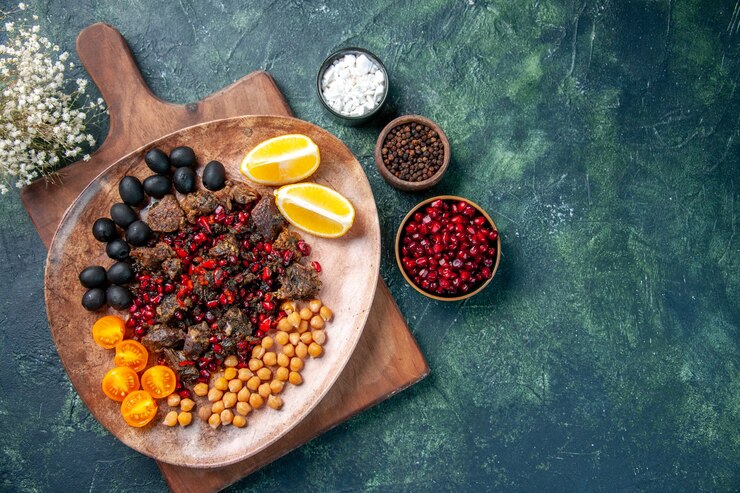आयुर्वेदिक डॉक्टर से प्रश्न पूछें और निःशुल्क या भुगतान मोड में अपनी चिंता की समस्या पर ऑनलाइन परामर्श प्राप्त करें। 2,000 से अधिक अनुभवी डॉक्टर हमारी साइट पर काम करते हैं और आपके प्रश्नों का इंतजार करते हैं और उपयोगकर्ताओं को उनकी स्वास्थ्य समस्याओं को हल करने में प्रतिदिन मदद करते हैं।
Kapha Diet: Insights from Ayurveda

Key Takeaways Shortly
- The Kapha Diet is a central aspect of Ayurveda, focusing on balancing the Kapha dosha for enhanced physical and mental well-being.
- Recognizing Kapha traits is crucial; these characteristics impact dietary needs and lifestyle choices.
- Strategies for balancing the Kapha dosha include specific lifestyle adjustments and dietary changes to address common imbalances.
- A variety of Kapha-friendly foods can be easily incorporated into your diet to help maintain dosha balance.
- Following a Kapha Diet can offer numerous benefits, such as improved digestion and increased energy levels.
The Kapha Diet is like a gentle guide that helps balance your body and mind according to Ayurveda. This ancient practice focuses on harmonizing your body's energies or doshas. The Kapha dosha, which is one of these energies, can sometimes make us feel sluggish or heavy. The Kapha Diet aims to lighten things up, both physically and mentally.
In this article, you'll discover how the Kapha Diet works and which foods can keep your energy in check. We'll explore tips to manage your Kapha dosha and suggest some Kapha-friendly foods. If you're looking to feel more vibrant and energetic, this guide could be your new best friend. Get ready to dive into the world of Ayurveda and find a balance that suits you!
Recognizing Kapha Traits
Understanding Kapha traits helps in tailoring the Kapha Diet for better health. Kapha, one of the three doshas in Ayurveda, is associated with earth and water elements. People with dominant Kapha tend to be calm, steady, and nurturing. They often have a strong build and excellent stamina. However, imbalance can lead to weight gain and lethargy.
A study published in the Journal of Ayurveda and Integrative Medicine highlights that Kapha types might face issues with metabolism. They can also be prone to conditions like sinus congestion and allergies due to their natural tendency towards heaviness and moisture.
Recognizing these traits is crucial for balancing Kapha dosha. For instance, a person noticing sluggishness or weight gain might need to adjust their lifestyle or diet. Incorporating Kapha-friendly foods like spicy or bitter flavors can help counteract these tendencies. Identifying and addressing these traits early can lead to improved well-being and energy levels. Understanding and applying these insights is a key step in maintaining balance in an Ayurvedic lifestyle.

Balancing the Kapha Dosha
Balancing Kapha dosha is like keeping a seesaw level. It's all about finding the right mix. Here are some tips to help you maintain balance:
-
Eat Kapha-friendly foods: Focus on light, warm, and spicy foods. Think of foods like ginger, black pepper, and turmeric. They help keep Kapha in check.
-
Stay active: Regular exercise is key. Activities like jogging or cycling can be great. They prevent the Kapha dosha from becoming too heavy or sluggish.
-
Mindful routine: Start your day with a routine. Wake up early, preferably before 6 AM. This aligns with nature's rhythms.
-
Avoid dairy and sweets: These can increase Kapha. Try to limit cheese and sugary treats.
-
Embrace variety: Include a mix of tastes in your meals. Bitter and astringent flavors, like leafy greens or lentils, can balance Kapha.
By following these steps, you can find a balance and feel more energetic.
Kapha-Friendly Foods to Try
When exploring a Kapha diet, it's all about finding the right balance to match your body's needs. Kapha dosha, known for its qualities of earth and water, can sometimes lead to sluggishness or weight gain. Incorporating Kapha-friendly foods can help maintain energy and well-being.
One important aspect of a Kapha diet is choosing foods that are light, dry, and warm. Think of food as a tool to counterbalance the heavy and oily nature of Kapha. For instance, leafy greens like spinach and kale are excellent choices. They are light and easy on the stomach, providing essential nutrients without weighing you down.
Ginger is another great addition to your meals. It's known for its warming properties, which can stimulate digestion and metabolism. A study found that ginger can increase calorie burn by up to 20% after eating (source: National Institute of Health). This makes it a valuable ally in managing Kapha's tendency towards weight gain.
Fruits like apples and pears are also Kapha-friendly. They offer a sweet taste without being too heavy. These fruits are packed with fiber, which aids digestion and keeps you full longer, helping to curb unnecessary snacking.
Spices play a crucial role in a Kapha diet. Cinnamon, cumin, and turmeric are not just flavorful but also help in balancing the dosha. They can add zest to your dishes while promoting better digestion and circulation.
When selecting grains, opt for barley or millet. These grains are lighter compared to wheat or rice, making them suitable for Kapha types. They provide energy without the sluggishness associated with heavier grains.
Incorporating these foods into your daily meals can make a significant difference. It's about creating meals that are flavorful yet balanced, helping you feel energetic and light.

Benefits of Following a Kapha Diet
The Kapha Diet, rooted in ayurveda, offers a range of benefits for those looking to balance their Kapha dosha. By focusing on Kapha-friendly foods, you can help maintain energy levels and promote overall well-being. Many find that this diet aids in reducing feelings of sluggishness and helps in achieving a more balanced lifestyle.
Eating according to your dosha type can be a game-changer for health. The Kapha Diet encourages lighter, drier foods, which can help boost metabolism and manage weight. These dietary choices often lead to improved digestion and increased vitality, making everyday activities feel less of a chore.
Engaging with ayurveda through a Kapha Diet isn't just about food. It’s about embracing a lifestyle that fosters harmony and balance. The approach encourages mindful eating, which can deepen your connection to how food impacts your body and mind.
If you're curious about ayurveda or the Kapha Diet, now’s the time to dive in. Share your thoughts in the comments, or pass this article along to a friend who might be interested. Explore more about balancing the Kapha dosha and discover how these ancient principles can fit into your life today. Your journey to a balanced life starts with a single step—and a single meal.
FAQ For Kapha Diet
What is the Kapha Diet?
The Kapha Diet is an Ayurvedic dietary approach designed to balance the Kapha dosha. It focuses on foods and practices that help reduce excess Kapha traits, such as heaviness and sluggishness, promoting overall physical and mental well-being.
How can I tell if I have a predominant Kapha dosha?
Individuals with a predominant Kapha dosha often exhibit traits like a stable, solid build, calm demeanor, and a tendency to gain weight easily. Recognizing these characteristics can help tailor dietary and lifestyle choices to better suit your dosha.
What are some common signs of Kapha imbalance?
Signs of a Kapha imbalance include feelings of lethargy, weight gain, congestion, and a lack of motivation. Addressing these symptoms through diet and lifestyle changes can help restore balance to the Kapha dosha.
What types of foods are recommended for a Kapha diet?
Kapha-friendly foods are typically light, dry, and warming, such as spicy vegetables, legumes, and astringent fruits. Incorporating these into your diet can help maintain the balance of your dosha.
Are there any foods Kapha individuals should avoid?
Yes, Kapha individuals should minimize heavy, oily, and cold foods, like dairy, fried foods, and excessive sweets, as they can exacerbate Kapha traits and lead to imbalances.
What lifestyle changes can support a balanced Kapha dosha?
To support a balanced Kapha dosha, incorporate regular exercise, maintain a consistent daily routine, and engage in stimulating activities. These lifestyle adjustments can help mitigate Kapha imbalances.
What are the benefits of following a Kapha Diet?
Following a Kapha Diet can lead to improved digestion, increased energy levels, better weight management, and enhanced mental clarity, contributing to a healthier and more balanced lifestyle.

